Attached files
| file | filename |
|---|---|
| EX-99.4 - EXHIBIT 99.4 - HERTZ GLOBAL HOLDINGS, INC | a994noticeofconditionalred.htm |
| EX-99.3 - EXHIBIT 99.3 - HERTZ GLOBAL HOLDINGS, INC | a993noticeofconditionalred.htm |
| EX-99.2 - EXHIBIT 99.2 - HERTZ GLOBAL HOLDINGS, INC | a992pressrelease-proposedp.htm |
| 8-K - 8-K - HERTZ GLOBAL HOLDINGS, INC | a2017securednotesoffering8.htm |

The Hertz Corporation
May 30, 2017

2
Forward-Looking Statements
Certain statements contained in this presentation are “forward-looking statements” within the meaning of the Private
Securities Litigation Reform Act of 1995. These statements give our current expectations or forecasts of future events and
our future performance and do not relate directly to historical or current events or our historical or current performance.
Most of these statements contain words that identify them as forward looking, such as “anticipate”, “estimate”, “expect”,
“project”, “intend”, “plan”, “believe”, “seek”, “will”, “may”, “opportunity”, “target” or other words that relate to future events,
as opposed to past or current events.
Forward-looking statements are based on the expectations, forecasts and assumptions of our management as of the date
made and involve risks and uncertainties, some of which are outside of our control, that could cause actual outcomes and
results to differ materially from current expectations. For some of the factors that could cause such differences, please
see the sections of our annual report on Form 10-K for the year ended December 31, 2016 entitled “Risk Factors” and
“Cautionary Note Regarding Forward-Looking Statements.” Copies of this report are available from the Securities and
Exchange Commission (“SEC”), on our website or through our Investor Relations department.
We cannot assure you that the assumptions under any of the forward-looking statements will prove accurate or that any
projections will be realized. We expect that there will be differences between projected and actual results. These forward-
looking statements speak only as of the date made, and we do not undertake any obligation to update or revise any
forward-looking statements, whether as a result of new information, future events or otherwise. We caution prospective
lenders not to place undue reliance on forward-looking statements. All forward-looking statements attributable to us are
expressly qualified in their entirety by the cautionary statements contained herein and in our annual report described
above.
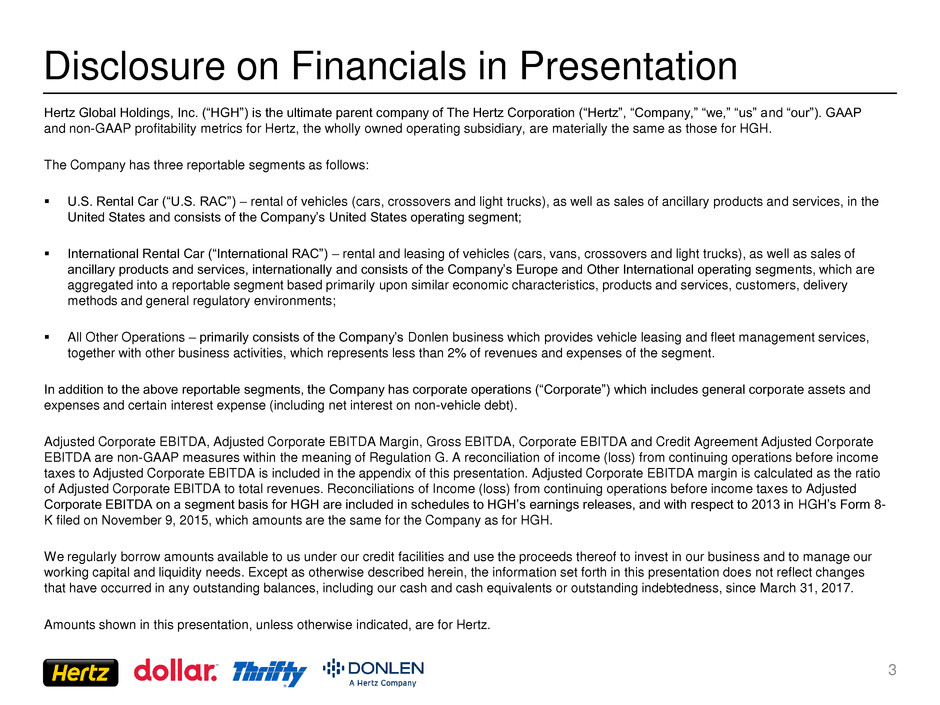
3
Disclosure on Financials in Presentation
Hertz Global Holdings, Inc. (“HGH”) is the ultimate parent company of The Hertz Corporation (“Hertz”, “Company,” “we,” “us” and “our”). GAAP
and non-GAAP profitability metrics for Hertz, the wholly owned operating subsidiary, are materially the same as those for HGH.
The Company has three reportable segments as follows:
U.S. Rental Car (“U.S. RAC”) – rental of vehicles (cars, crossovers and light trucks), as well as sales of ancillary products and services, in the
United States and consists of the Company’s United States operating segment;
International Rental Car (“International RAC”) – rental and leasing of vehicles (cars, vans, crossovers and light trucks), as well as sales of
ancillary products and services, internationally and consists of the Company’s Europe and Other International operating segments, which are
aggregated into a reportable segment based primarily upon similar economic characteristics, products and services, customers, delivery
methods and general regulatory environments;
All Other Operations – primarily consists of the Company’s Donlen business which provides vehicle leasing and fleet management services,
together with other business activities, which represents less than 2% of revenues and expenses of the segment.
In addition to the above reportable segments, the Company has corporate operations (“Corporate”) which includes general corporate assets and
expenses and certain interest expense (including net interest on non-vehicle debt).
Adjusted Corporate EBITDA, Adjusted Corporate EBITDA Margin, Gross EBITDA, Corporate EBITDA and Credit Agreement Adjusted Corporate
EBITDA are non-GAAP measures within the meaning of Regulation G. A reconciliation of income (loss) from continuing operations before income
taxes to Adjusted Corporate EBITDA is included in the appendix of this presentation. Adjusted Corporate EBITDA margin is calculated as the ratio
of Adjusted Corporate EBITDA to total revenues. Reconciliations of Income (loss) from continuing operations before income taxes to Adjusted
Corporate EBITDA on a segment basis for HGH are included in schedules to HGH’s earnings releases, and with respect to 2013 in HGH’s Form 8-
K filed on November 9, 2015, which amounts are the same for the Company as for HGH.
We regularly borrow amounts available to us under our credit facilities and use the proceeds thereof to invest in our business and to manage our
working capital and liquidity needs. Except as otherwise described herein, the information set forth in this presentation does not reflect changes
that have occurred in any outstanding balances, including our cash and cash equivalents or outstanding indebtedness, since March 31, 2017.
Amounts shown in this presentation, unless otherwise indicated, are for Hertz.

Business Overview
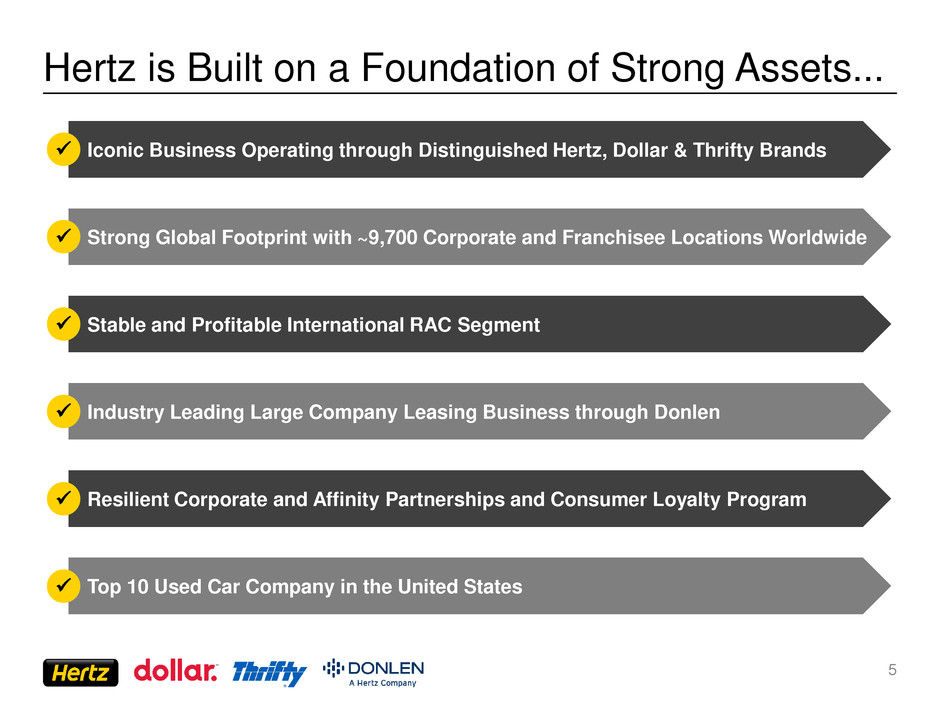
5
Hertz is Built on a Foundation of Strong Assets...
Top 10 Used Car Company in the United States
Iconic Business Operating through Distinguished Hertz, Dollar & Thrifty Brands
Strong Global Footprint with ~9,700 Corporate and Franchisee Locations Worldwide
Stable and Profitable International RAC Segment
Resilient Corporate and Affinity Partnerships and Consumer Loyalty Program
Industry Leading Large Company Leasing Business through Donlen

6
One of three major players in the North
American car rental industry with ~$9
billion in revenue in 2016
...That We Believe Will Drive Future Growth and Profitability…
Iconic Business &
Well-Recognized Brands
Strong Global Footprint
Stable & Profitable International
RAC Segment
Leading Donlen Leasing Business
Resilient Partnerships & Consumer
Loyalty Program
Top 10 Used Car Company in the
United States
International
Revenue
24%
U.S. Revenue
76%
~9,700 locations in the United States,
Australia, New Zealand as well as all
major markets in Europe
Rental locations in ~150 countries
Fleet management expertise enables
Hertz to further participate in evolving
mobility landscape
As of year-end 2016, ~175,000 vehicles
at Donlen
$9.2 $9.5 $9.0 $8.8
2013 2014 2015 2016
International RAC Other Ops U.S. RAC
Announces long-term strategic
partnership with Localiza, South
America’s largest rental car company
Announces partnership with CAR Inc.
providing exposure to fast growing
market in China
Rapidly growing customer loyalty
program, with over 10 million members
globally
As measured by units sold, 9th largest
used car company in the United States
through 80 retail outlets
65% of re-marketing through higher-
yielding, non-auction channels
2016 Revenue by Geography
Historical Revenue Profile
($ in billions)

7
…With Int’l and Donlen Providing a Stable Earnings Base…
We believe we have a leading market share position in major European
airports2
Highly recurring franchisee revenue of over $117 million (Q1 2017 LTM)
58%3 program vehicles for International RAC
Less volatile used car market
International RAC
Revenue
All Other Operations (Includes Donlen)
$175 $188
$255
$228 $220
2013 2014 2015 2016 LTM Q1
2017
Adj. Corp. EBITDA
$527
$568 $583 $592 $600
2013 2014 2015 2016 LTM Q1
2017
Revenue
$53
$60
$66
$69
$72
2013 2014 2015 2016 LTM Q1
2017
Adj. Corp. EBITDA
U.S.
RAC
69%
Int'l
RAC
24%
Donlen
7%
Diversified blue-chip customer base with virtually zero credit losses over
last five years
Strong growth with additional opportunities in ride sharing
Highly recurring revenue and EBITDA
A leading technology innovator for services in the fleet leasing industry
U.S.
RAC
48%
Int'l
RAC
39%
Donlen
13%
Int’l RAC and Donlen represent ~50% of Q1 2017 LTM Adj. Corporate EBITDA
% Q1 2017 LTM Revenue By Segment % Q1 2017 LTM Adj. Corp. EBITDA By Segment1
$2,378 $2,436
$2,148 $2,097 $2,075
2013 2014 2015 2016 LTM Q1
2017
Note: $ in millions.
1 Excludes corporate operations, which includes general corporate assets and expenses and certain interest expense (including net interest on non-vehicle debt).
2 Based on locations where data regarding rental concessionaire activity is available.
3 Purchases for year-ended December 31, 2016.
Donlen

8
...and Successfully Navigate Industry Headwinds
Pricing
Pressures
Pricing has historically responded to changes in fleet costs, but typically lags ~9 months
Over-fleeting has created “high” pricing pressure environment
Hertz is positioning itself to capture quality demand through investments in revenue management
systems and improve pricing through fleet optimization
Fleet
Management
Hertz historically fleeted to an aspirational growth assumption resulting in overfleeting
Furthermore, oversupply of used cars entering the market is expected to continue pressuring residual
values
Hertz is actively resizing its fleet to reduce risk of overfleeting and intends to negotiate model year
2018 purchases at prices that reflect the residual market environment
Over time Hertz intends to optimize the mix of vehicles in a manner that maximizes RPD and
provides responsiveness to changing levels of car rental demand
Competitive Threat
From Ride Share
Operators
Ride share operators have emerged as alternative transportation under certain use cases
— We believe this reflects only a small percentage of our revenue base
Modest negative impact on shorter duration car rentals (1-3 days)
— Presents profitable partnership opportunities
Currently have agreements with Uber and Lyft to supply drivers with 1-week to monthly rentals
Despite their presence, top 100 U.S. airport industry revenue grew nearly 3% in 2016 vs. 2015
1
2
3
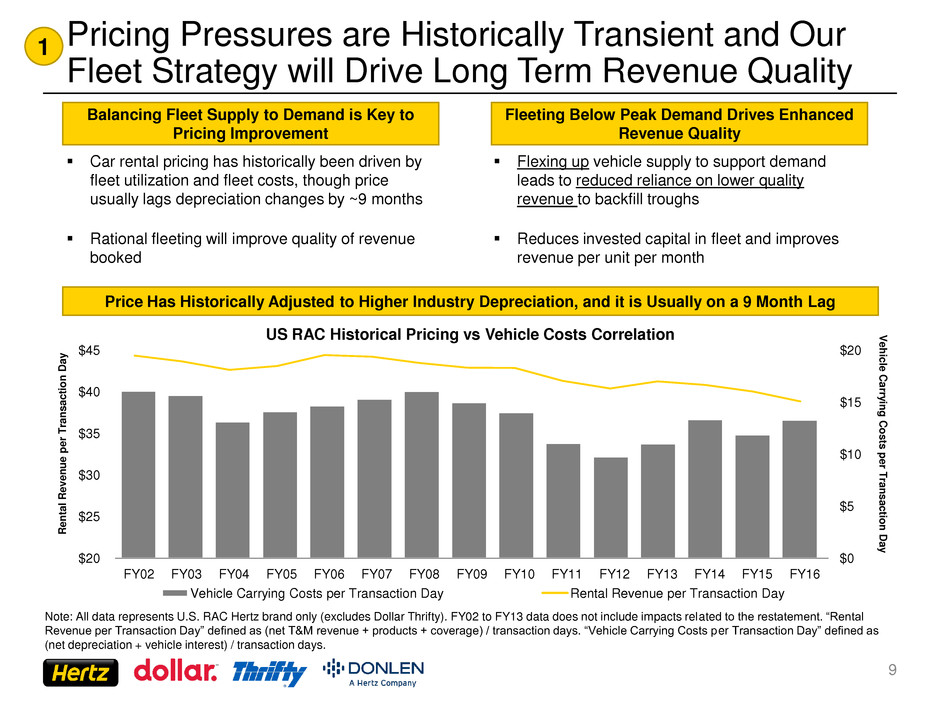
9
Pricing Pressures are Historically Transient and Our
Fleet Strategy will Drive Long Term Revenue Quality
Car rental pricing has historically been driven by
fleet utilization and fleet costs, though price
usually lags depreciation changes by ~9 months
Rational fleeting will improve quality of revenue
booked
1
Balancing Fleet Supply to Demand is Key to
Pricing Improvement
Fleeting Below Peak Demand Drives Enhanced
Revenue Quality
Flexing up vehicle supply to support demand
leads to reduced reliance on lower quality
revenue to backfill troughs
Reduces invested capital in fleet and improves
revenue per unit per month
Price Has Historically Adjusted to Higher Industry Depreciation, and it is Usually on a 9 Month Lag
Note: All data represents U.S. RAC Hertz brand only (excludes Dollar Thrifty). FY02 to FY13 data does not include impacts related to the restatement. “Rental
Revenue per Transaction Day” defined as (net T&M revenue + products + coverage) / transaction days. “Vehicle Carrying Costs per Transaction Day” defined as
(net depreciation + vehicle interest) / transaction days.
$0
$5
$10
$15
$20
$20
$25
$30
$35
$40
$45
FY02 FY03 FY04 FY05 FY06 FY07 FY08 FY09 FY10 FY11 FY12 FY13 FY14 FY15 FY16
US RAC Historical Pricing vs Vehicle Costs Correlation
Vehicle Carrying Costs per Transaction Day Rental Revenue per Transaction Day
R
e
n
ta
l
R
e
v
e
nue
pe
r
T
ra
ns
a
c
ti
on
D
a
y
V
e
h
ic
le
C
a
rr
y
ing
C
os
ts
pe
r T
ra
ns
a
c
tion
D
a
y

10
Fleet Optimization To Better Align with Industry Demands
Aggressively sold vehicles in 1Q
2017 to right size fleet capacity,
despite industry residual weakness
Expect fleet optimization initiatives
to be completed by end of 2Q 2017
2
490 499 490 485
161 167 169 173
170 173 164 175
821 839 823 833
2013 2014 2015 2016
U.S. RAC International RAC Donlen
Average Vehicle Fleet Over Time (000s)
Optimized fleet improves pricing,
reduces operational cost volatility,
and improves time of fleet
remarketing
Should allow for YoY utilization
improvements in back half 2017

11
Emergence of Ride Share Operators Presents
Potential Growth Opportunities
3
Proactively established partnerships with Uber and Lyft to supply U.S. drivers with cars under specified rental
agreement, turning ride-sharing into a revenue opportunity
Enhancing ease and speed of rental car service via mobile applications and “counter-less” checkout
Improves fleet utilization of off-airport, a
business that typically experiences lower
demand than on-airport as a result of
including a minimum one-week rental
Used as a sales channel for older vehicles
that are nearing rotation out of fleet
Enables Hertz to extend the useful life of a
revenue earning asset at a time when the
depreciation curve is less steep
Rental Period (Days)
0-1 2-3 4-5 6+
Miles
per Day
<10
4% of Total Revenue
10 – 30
30 – 60
60+
Revenue most vulnerable to ride-sharing
Limited U.S. RAC Revenue Vulnerability to Ride-Sharing Ride-Sharing Partnership Highlights
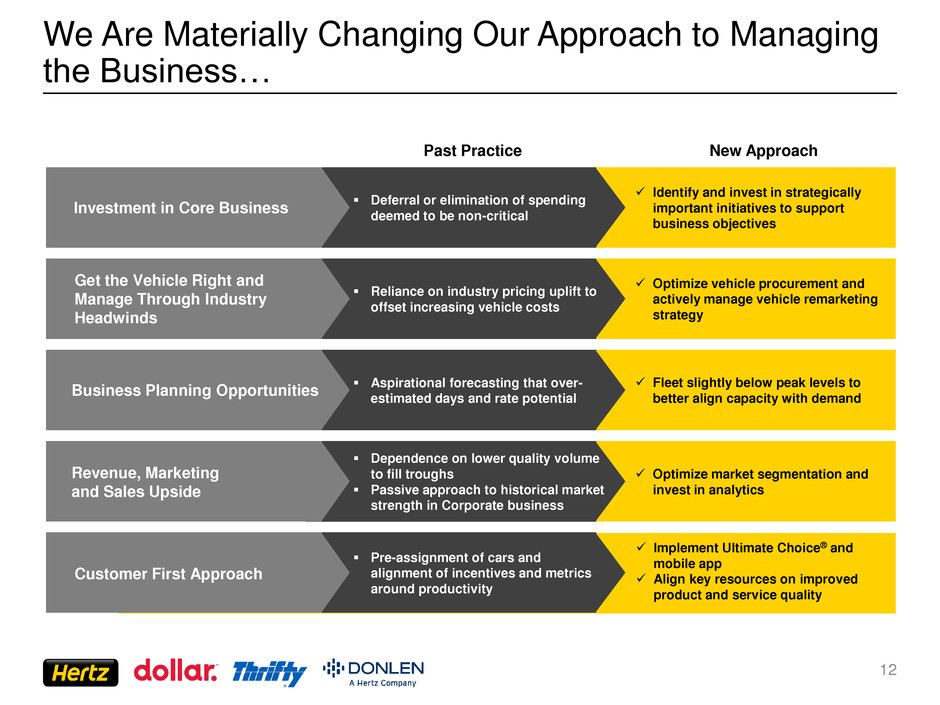
12
We Are Materially Changing Our Approach to Managing
the Business…
New Approach Past Practice
Investment in Core Business
Deferral or elimination of spending
deemed to be non-critical
Identify and invest in strategically
important initiatives to support
business objectives
Get the Vehicle Right and
Manage Through Industry
Headwinds
Reliance on industry pricing uplift to
offset increasing vehicle costs
Optimize vehicle procurement and
actively manage vehicle remarketing
strategy
Business Planning Opportunities
Aspirational forecasting that over-
estimated days and rate potential
Fleet slightly below peak levels to
better align capacity with demand
Revenue, Marketing
and Sales Upside
Dependence on lower quality volume
to fill troughs
Passive approach to historical market
strength in Corporate business
Optimize market segmentation and
invest in analytics
Customer First Approach
Pre-assignment of cars and
alignment of incentives and metrics
around productivity
Implement Ultimate Choice® and
mobile app
Align key resources on improved
product and service quality

13
… and Measurable Progress is Already Being Delivered…
Opportunity Current State
Vehicle
Fleet
Improve vehicle mix
Provide competitive trim and choice
Meet free upgrade performance
targets
Compact mix declined 400 basis points in Q1 2017 vs. Q1 2016
and was under 17% of fleet at the end of April 2017
Invested ~$70mm in trim and premium vehicles
Improved upgrades at top 20 U.S. airports from 45% in
September 2016 to currently near 80% for Platinum and
President’s Circle members
Operations
Update service delivery model and
improve speed and convenience
Improve agent training, incentive
design and service
Provide clean cars consistently
Ultimate Choice new service delivery model on track and
projected to be in 60% of total airport revenue markets by mid-
year 2017 and 80% by year-end 2017
Agent incentives adjusted to focus on service and productivity
Over 70 new car washes will be installed by mid-year 2017 and
new cleaner standards in place
Technology Modernize IT Platform
As of June 1, 2017, next generation revenue management
system live in 100% of U.S. markets
Modernized e-commerce platform scheduled for completion by
year-end 2017
New fleet accounting, management and reservation and rental
systems in process to be delivered in 2018 and early 2019
Brand &
Marketing
Invest in marketing and
e-commerce activities
Reposition brand and segment
customers with brands never
executed since Dollar Thrifty
acquisition
Investing incremental dollars in partnerships and e-commerce
activities
Brand repositioning and market segmentation work-in-progress

14
IT Platform / Cost of Delivery
• IT outsourcing
• Customer relationship
management system
• Global fleet management
system
US RAC Direct Operations
Expenses
Back Office Optimization and
General Overhead
• Vehicle damage collections
process
• Labor productivity
improvements
• Improved sourcing
• Outsourced accounts payable operations
• Outsourced US claims processing
• Reduced strategic consulting spend
• Streamlined vehicle administrative operations
Consolidated Cost Savings
• FY:17E expected savings of ~$160M
• FY:16 realized savings of ~$350M
• FY:15 realized savings of $229M
… With Improved Cost Structure and Investments to Drive
Further Cost Take-outs
Note: Consolidated Unit Costs Metrics Reflect Initiative Progress.
Cost Efficiency Remains a Priority
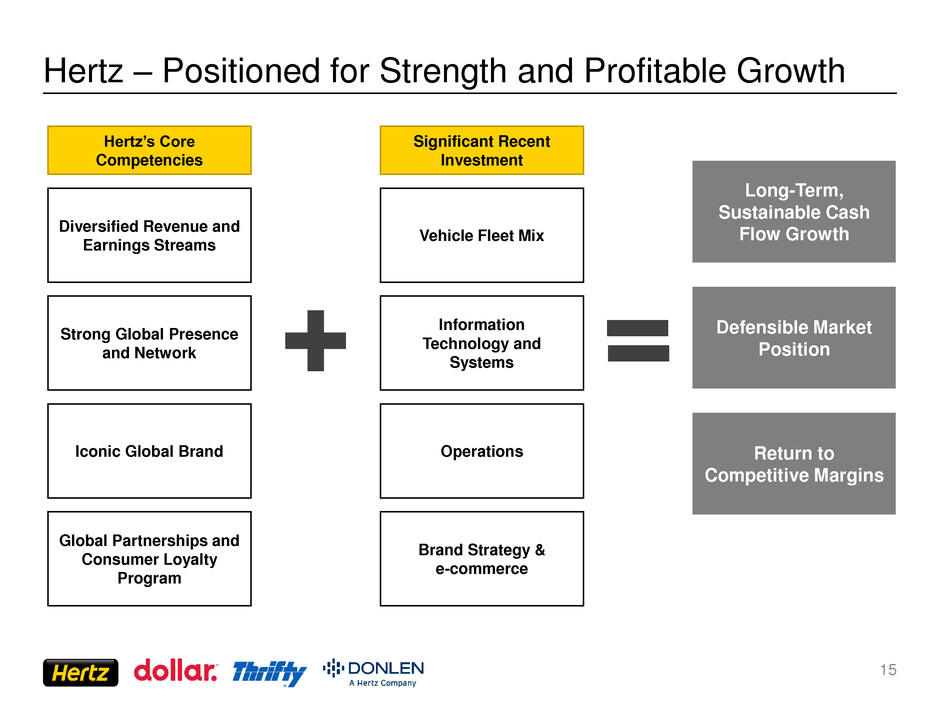
15
Significant Recent
Investment
Hertz’s Core
Competencies
Diversified Revenue and
Earnings Streams
Strong Global Presence
and Network
Iconic Global Brand
Global Partnerships and
Consumer Loyalty
Program
Vehicle Fleet Mix
Information
Technology and
Systems
Operations
Brand Strategy &
e-commerce
Long-Term,
Sustainable Cash
Flow Growth
Defensible Market
Position
Return to
Competitive Margins
Hertz – Positioned for Strength and Profitable Growth

16
Key Credit Highlights
Flexible Pro Forma Capital Structure & Attractive Maturity Profile 7
Significant Structural Protection for Notes 6
Diversified Business Mix 1
Major Player in Consolidated Rental Car Industry 2
Recent Investments are Expected to Improve Profitability 3
Limited Vulnerability & Role to Play in Evolving Mobility Landscape 5
Liquid Asset Base & Variable Cost Structure Provides Cyclical Durability 4

Financial Overview

18
Attractive Financial Attributes
Strong Free Cash Flow Generation
Largely Discretionary Non-fleet Capex
Significant Tax Assets (NOLs) Resulting in Low Cash Taxes
Strong Liquidity Position with No Significant Near-
Term Corporate Maturities
Highly Variable Cost Structure
Liquid Fleet Assets with Embedded Equity
No Structural Reasons Why Hertz Cannot Achieve Competitive Industry Margins
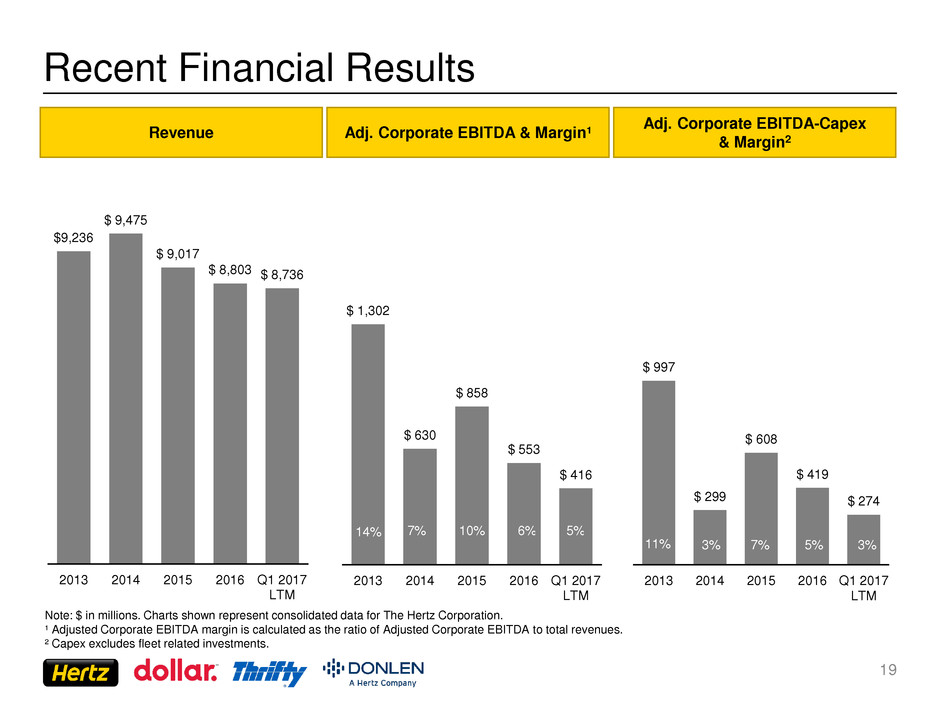
19
Recent Financial Results
$9,236
$ 9,475
$ 9,017
$ 8,803 $ 8,736
2013 2014 2015 2016 Q1 2017
LTM
$ 1,302
$ 630
$ 858
$ 553
$ 416
2013 2014 2015 2016 Q1 2017
LTM
7% 10% 5% 6% 14%
$ 997
$ 299
$ 608
$ 419
$ 274
2013 2014 2015 2016 Q1 2017
LTM
3% 7% 5% 3% 11%
Note: $ in millions. Charts shown represent consolidated data for The Hertz Corporation.
¹ Adjusted Corporate EBITDA margin is calculated as the ratio of Adjusted Corporate EBITDA to total revenues.
² Capex excludes fleet related investments.
Revenue Adj. Corporate EBITDA & Margin¹
Adj. Corporate EBITDA-Capex
& Margin2
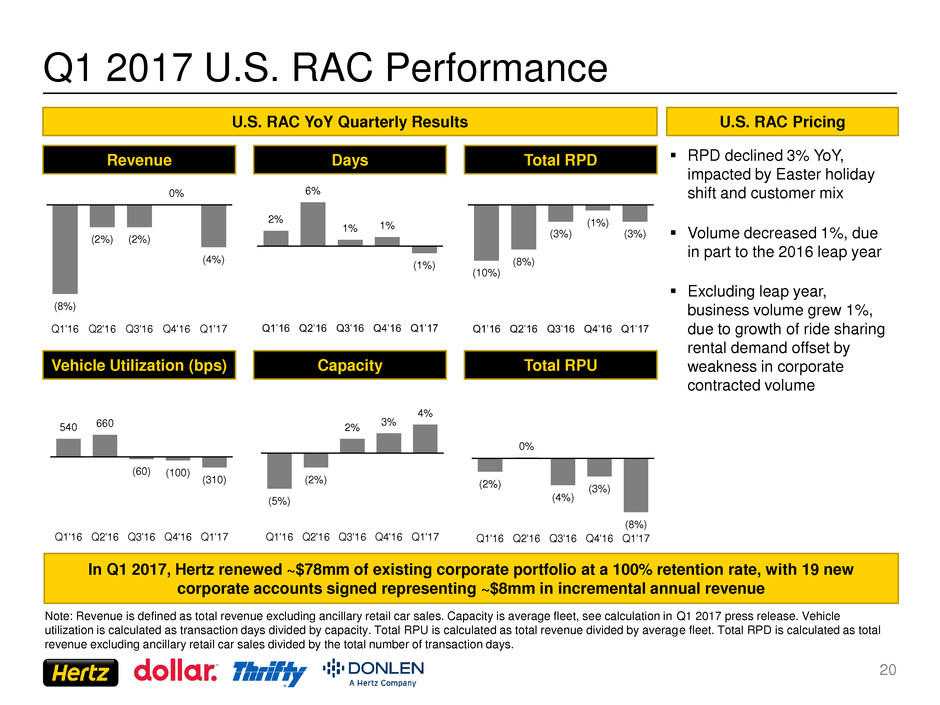
20
In Q1 2017, Hertz renewed ~$78mm of existing corporate portfolio at a 100% retention rate, with 19 new
corporate accounts signed representing ~$8mm in incremental annual revenue
Q1 2017 U.S. RAC Performance
Note: Revenue is defined as total revenue excluding ancillary retail car sales. Capacity is average fleet, see calculation in Q1 2017 press release. Vehicle
utilization is calculated as transaction days divided by capacity. Total RPU is calculated as total revenue divided by average fleet. Total RPD is calculated as total
revenue excluding ancillary retail car sales divided by the total number of transaction days.
RPD declined 3% YoY,
impacted by Easter holiday
shift and customer mix
Volume decreased 1%, due
in part to the 2016 leap year
Excluding leap year,
business volume grew 1%,
due to growth of ride sharing
rental demand offset by
weakness in corporate
contracted volume
(8%)
(2%) (2%)
0%
(4%)
Q1'16 Q2'16 Q3'16 Q4'16 Q1'17
2%
6%
1% 1%
(1%)
Q1’16 Q2’16 Q3’16 Q4’16 Q1’17
(10%)
(8%)
(3%)
(1%)
(3%)
Q1’16 Q2’16 Q3’16 Q4’16 Q1’17
540 660
(60) (100)
(310)
Q1'16 Q2'16 Q3'16 Q4'16 Q1'17
(5%)
(2%)
2%
3%
4%
Q1'16 Q2'16 Q3'16 Q4'16 Q1'17
(2%)
0%
(4%)
(3%)
(8%)
Q1'16 Q2'16 Q3'16 Q4'16 Q1'17
U.S. RAC YoY Quarterly Results
Revenue Days Total RPD
Vehicle Utilization (bps) Capacity Total RPU
U.S. RAC Pricing

21
U.S. RAC Fleet Management
Note: Quarterly trends reflect seasonality. Rentable Vehicle Utilization is calculated by dividing transaction days by available car days, excluding fleet unavailable
for rent e.g.: recalled, out of service, and vehicle in onboarding and remarketing channels.
34%
24%
42%
35%
24%
41%
Auction Retail Dealer Direct
1Q:17
1Q:16
540
660
(60) (100)
(310)
240
380
(60) (50)
(170)
Vehicle UTE Rentable UTE
Q1’16 Q2’16 Q3’16 Q4’16 Q1’17
Rentable utilization 170 basis points lower 1Q
2017 vs 1Q 2016, as mild weather impacted
demand in certain segments such as Insurance
Replacement and certain sun destinations
Expect fleet optimization initiatives to be
completed by end of 2Q 2017
Should allow for YoY utilization improvements in
back half 2017
Aggressively sold Risk cars in 1Q 2017 to right
size capacity, despite industry residual weakness
Sold 21% more risk vehicles YoY
Outlook for FY17 residual decline adjusted from
-3% to -3.5%
Supply agreements with Uber / Lyft provide
drivers with rental cars the company rotates out
of its fleet
Non-Program Vehicle Disposition Channel Mix
Q1 2017 Vehicle Utilization YoY Basis Point Incr. / (Decr.)
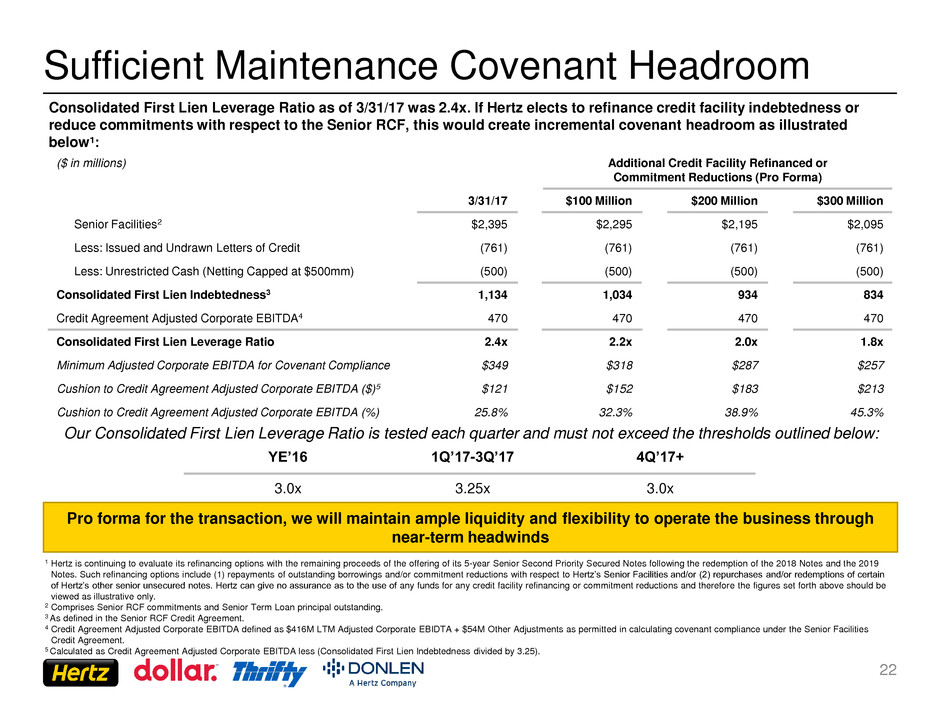
22
($ in millions) Additional Credit Facility Refinanced or
Commitment Reductions (Pro Forma)
3/31/17 $100 Million $200 Million $300 Million
Senior Facilities2 $2,395 $2,295 $2,195 $2,095
Less: Issued and Undrawn Letters of Credit (761) (761) (761) (761)
Less: Unrestricted Cash (Netting Capped at $500mm) (500) (500) (500) (500)
Consolidated First Lien Indebtedness3 1,134 1,034 934 834
Credit Agreement Adjusted Corporate EBITDA4 470 470 470 470
Consolidated First Lien Leverage Ratio 2.4x 2.2x 2.0x 1.8x
Minimum Adjusted Corporate EBITDA for Covenant Compliance $349 $318 $287 $257
Cushion to Credit Agreement Adjusted Corporate EBITDA ($)5 $121 $152 $183 $213
Cushion to Credit Agreement Adjusted Corporate EBITDA (%) 25.8% 32.3% 38.9% 45.3%
Consolidated First Lien Leverage Ratio as of 3/31/17 was 2.4x. If Hertz elects to refinance credit facility indebtedness or
reduce commitments with respect to the Senior RCF, this would create incremental covenant headroom as illustrated
below¹:
Our Consolidated First Lien Leverage Ratio is tested each quarter and must not exceed the thresholds outlined below:
YE’16 1Q’17-3Q’17 4Q’17+
3.0x 3.25x 3.0x
1 Hertz is continuing to evaluate its refinancing options with the remaining proceeds of the offering of its 5-year Senior Second Priority Secured Notes following the redemption of the 2018 Notes and the 2019
Notes. Such refinancing options include (1) repayments of outstanding borrowings and/or commitment reductions with respect to Hertz’s Senior Facilities and/or (2) repurchases and/or redemptions of certain
of Hertz’s other senior unsecured notes. Hertz can give no assurance as to the use of any funds for any credit facility refinancing or commitment reductions and therefore the figures set forth above should be
viewed as illustrative only.
2 Comprises Senior RCF commitments and Senior Term Loan principal outstanding.
3 As defined in the Senior RCF Credit Agreement.
4 Credit Agreement Adjusted Corporate EBITDA defined as $416M LTM Adjusted Corporate EBIDTA + $54M Other Adjustments as permitted in calculating covenant compliance under the Senior Facilities
Credit Agreement.
5 Calculated as Credit Agreement Adjusted Corporate EBITDA less (Consolidated First Lien Indebtedness divided by 3.25).
Pro forma for the transaction, we will maintain ample liquidity and flexibility to operate the business through
near-term headwinds
Sufficient Maintenance Covenant Headroom
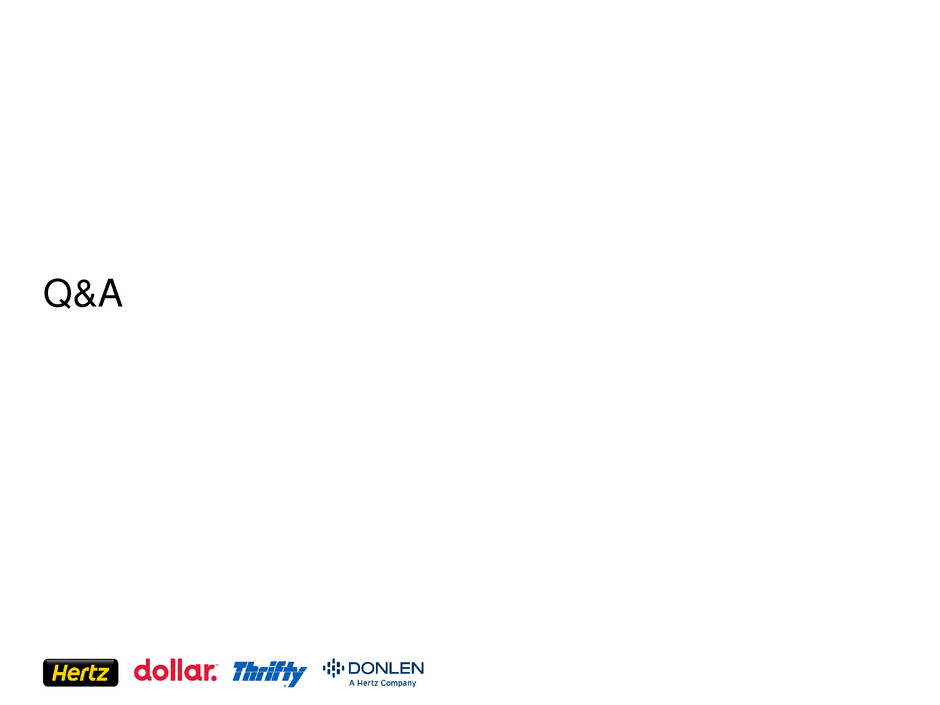
Q&A

Appendix B: Supplemental Materials

25
Adjusted Corporate EBITDA Reconciliation
Note: Amounts for the twelve months ended March 31, 2017 are calculated as the corresponding amounts for the three months ended March 31, 2017 plus the corresponding amounts for the year ended
December 31, 2016 less the corresponding amounts for the three months ended March 31, 2016. $ in millions.
1. Represents debt-related charges relating to the amortization of deferred financing costs and debt discounts and premiums.
2. In 2016, amount represents $6 million of deferred financing costs written off as a result of terminating and refinancing various vehicle debt.
3. Represents expenses incurred under restructuring actions as defined in U.S. GAAP, excluding impairments and asset write-downs which are shown separately in the table. Also represents certain other
charges such as incremental costs incurred directly supporting business transformation initiatives. Such costs include transition costs incurred in connection with business process outsourcing arrangements
and incremental costs incurred to facilitate business process re-engineering initiatives that involve significant organization redesign and extensive operational process changes. Also includes consulting costs
and legal fees related to the previously disclosed accounting review and investigation.
4. For the first quarter 2017, excludes $2 million of stock-based compensation expenditures included in restructuring and restructuring related charges.
5. Represents the pre-tax gain on the sale of CAR Inc. common stock.
6. For the first quarter 2017, represents a $30 million impairment of an equity method investment. In 2016, primarily comprised of a $172 million impairment of goodwill associated with the Company's vehicle
rental operations in Europe, a $120 million impairment of the Dollar Thrifty tradename, a $25 million impairment of certain tangible assets used in the U.S. RAC segment in conjunction with a restructuring
program and an $18 million impairment of the net assets held for sale related to the Company's Brazil operations. In 2015, primarily comprised of a $40 million impairment of an international tradename
associated with the Company's former equipment rental business, a $6 million impairment of the former Dollar Thrifty headquarters, a $5 million impairment of a building in the U.S. RAC Segment and a $3
million impairment of a corporate asset. In 2014, primarily comprised of a $13 million impairment related to the Company's former corporate headquarters building in New Jersey and a $10 million
impairment of assets related to a contract termination.
7. Represents external costs associated with the Company’s finance and information technology transformation programs, both of which are multi-year initiatives that commenced in 2016 to upgrade and
modernize the Company’s systems and processes.
8. Includes miscellaneous, non-recurring and other non-cash items and, in the first quarter 2017, includes an adjustment to the carrying value of the Company's Brazil operations in connection with its
classification as held for sale. In 2016, also includes a $9 million settlement gain from an eminent domain case related to one of the Company's airport locations. For 2015, also includes a $23 million charge
recorded in relation to a French road tax matter, $5 million of costs related to the integration of Dollar Thrifty and $5 million in relocation expenses incurred in connection with the relocation of the Company's
corporate headquarters to Estero, Florida. In 2014, also includes $10 million in acquisition related costs and charges, $9 million of costs related to the integration of Dollar Thrifty, and $9 million in relocation
expenses incurred in connection with the relocation of the Company's corporate headquarters, partially offset by a $19 million settlement received in relation to a class action lawsuit filed against a vehicle
manufacturer. In 2013, also includes $29 million of premiums paid on debt to redeem our 8.50% former European Fleet Notes, $62 million of acquisition costs and integration charges primarily related with
our acquisition of Dollar Thrifty in 2012 and $6 million in costs associated with the relocation of our corporate headquarters.
9. LTM Adjusted Corporate EBIDTA. Excludes $54M add-back as permitted in calculating covenant compliance under the Senior RCF Credit Agreement.
Three Months Ended March 31, Year Ended December 31,
LTM 3/31/2017 2017 2016 2016 2015 2014 2013
Non-GAAP Reconciliation
Income (loss) from continuing operations before income taxes $(686) $(293) $(76) $(469) $132 $(231) $394
Depreciation and amortization 2,942 759 683 2,866 2,707 2,996 2,499
Interest, net of interest income 602 129 150 623 599 617 644
Gross EBITDA 2,858 595 757 3,020 3,438 3,382 3,537
Revenue earning vehicle depreciation and less charges, net (2,686) (701) (616) (2,601) (2,433) (2,705) (2,234)
Vehicle debt interest (282) (71) (69) (280) (253) (277) (302)
Vehicle debt‑related charges(1) 25 7 10 28 42 31 32
Loss on extinguishment of vehicle‑related debt(2) 6 – – 6 – – –
Corporate EBITDA (79) (170) 82 173 794 431 1,033
Non-cash and stock-based employee compensation charges 15 7 5 13 16 9 33
Restructuring and restructuring related charges
(3)(4)
47 6 12 53 84 157 88
Sale of CAR Inc. common stock
(5)
(12) (3) (75) (84) (133) – –
Impairment charges and asset write‑downs(6) 370 30 – 340 57 24 40
Finance and information technology transformation costs
(7)
64 19 8 53 – – –
Other
(8)
11 1 (5) 5 40 9 108
Adjusted Corporate EBITDA $416 $(110) $27 $553 $858 $630 $1,302
Capital Asset Expenditures, non-vehicle ("capex") (142) (54) (46) (134) (250) (331) (305)
Adjusted Corporate EBITDA less capex $274 $(164) $(19) $419 $608 $299 $997(9)
